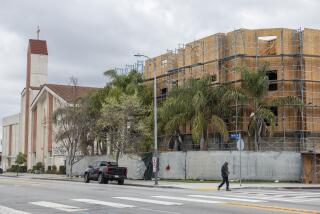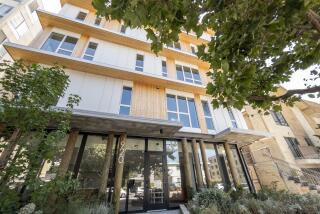CALIFORNIA COMMENTARY : Make ‘Strangers’ Truly Welcome : The Supreme Court decision upholding Proposition 13 makes reform of its inequities even more of a priority.
The Supreme Court, in upholding Proposition 13, sent a message to the people of this country: Government can favor affluent, politically powerful longtime property owners at the expense of immigrants, young families and other newcomers who are seeking their share of the American dream. This is acceptable even when these newcomers have no effective political recourse. At a time when the Los Angeles riots have vividly illustrated mass discontent with the status quo, the Supreme Court decision is particularly ironic and inopportune.
In fact, most community and political leaders agree that the two goals Los Angeles must achieve to foster real and lasting change in the face of the recent unrest are increased homeownership among inner-city residents and the creation of new businesses. Homeowners have a stake in their neighborhoods and thus work more actively to improve their communities. Businesses provide job opportunities to local residents, as well as products and services to the community.
Proposition 13 poses serious obstacles to achieving either goal. Despite the Supreme Court decision, the reform of Proposition 13’s assessment provisions should be a priority of everyone involved in the process of rebuilding.
Proposition 13 forces new home and business owners to pay 10 to 15 times more in property taxes than longtime owners of identical property. The Supreme Court recognized that Proposition 13, “California’s grand experiment . . . appears to vest benefits in a broad, powerful and entrenched segment of society”--longtime property owners. Nevertheless, the court let Proposition 13 stand.
California can no longer afford such a grand experiment. Low- and middle-income potential home buyers and entrepreneurs seeking to open shop in urban areas--the very people urban revitalization programs are supposed to help--are hurt the most by Proposition 13. Those fortunate enough to have bought property in the early 1970s, who have seen their property skyrocket in value in the wild real-estate market of the 1980s, are most helped by Proposition 13. The new owner of a tiny house in Watts (one of the few homes that a low- or moderate-income family in Los Angeles could potentially afford) pays the same property-tax bill as the longtime owner of a large, $1-million Palos Verdes home with a sweeping view of the ocean. If California is serious about making homeownership more affordable and increasing urban business development, Proposition 13 is not the answer. It is part of the problem.
Despite the scare tactics of Proposition 13’s supporters, we can reform our property-tax system in a way that is fair and equitable and avoids serious hardship. Though Proposition 13’s assessment provisions discriminate against new property owners, all property owners, old and new, are taxed at the same rate of 1% per year. By eliminating the discriminatory assessment provisions and treating all taxpayers equally, Los Angeles County could reduce the tax rate to less than 1/2 of 1% per year with no loss of tax revenue. A 50% cut in the property-tax rate would promote the important goals of homeownership and new business investment in the riot-torn and inner-city Los Angeles areas.
Such reform would not, as Proposition 13’s defenders claim, lead to the high tax rates that existed before its passage. Nor would senior citizens and others on fixed incomes be taxed out of their homes, another claim often voiced to frighten people away from meaningful reform.
In addition to changing the discriminatory assessment provisions, reform should include expanded protections of already available programs (such as assistance in paying taxes and postponement of payment of taxes until the property is sold) for citizens on fixed incomes.
Proposition 13’s assessment scheme is sarcastically referred to as the “welcome, stranger” method of taxation. It bestows its greatest benefits on those who, not coincidentally, owned their property at the time Proposition 13 was put to a vote. It imposes its harshest penalties to “welcome” the “stranger” newcomer property buyers.
The Supreme Court decision allows Californians to continue to embrace such a shortsighted, selfish philosophy. We should reject it, and instead truly welcome those “stranger” groups who now most need our assistance.
More to Read
Get the L.A. Times Politics newsletter
Deeply reported insights into legislation, politics and policy from Sacramento, Washington and beyond. In your inbox three times per week.
You may occasionally receive promotional content from the Los Angeles Times.










